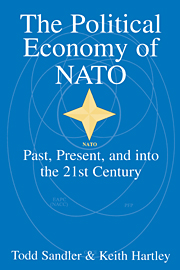Book contents
- Frontmatter
- Contents
- List of tables and figures
- Preface
- 1 NATO at the crossroads: An introduction
- 2 NATO burden sharing and related issues
- 3 On NATO expansion
- 4 NATO and peacekeeping
- 5 NATO and the defense industrial base: EU and USA
- 6 NATO challenges on the horizon
- 7 NATO and Europe
- 8 NATO design
- 9 Conclusions and future scenarios
- References
- Author index
- Subject index
7 - NATO and Europe
Published online by Cambridge University Press: 05 June 2012
- Frontmatter
- Contents
- List of tables and figures
- Preface
- 1 NATO at the crossroads: An introduction
- 2 NATO burden sharing and related issues
- 3 On NATO expansion
- 4 NATO and peacekeeping
- 5 NATO and the defense industrial base: EU and USA
- 6 NATO challenges on the horizon
- 7 NATO and Europe
- 8 NATO design
- 9 Conclusions and future scenarios
- References
- Author index
- Subject index
Summary
The end of the Cold War had major implications for NATO, the European Union, and the United Nations. NATO is basically a voluntary international military club, originally designed to meet a specific Cold War threat, and now seeking to develop new roles. Until the early 1990s, the European Union was a voluntary international economic club with no military activities. Similarly, the United Nations is a voluntary worldwide general club which lacks any military capabilities and which relies on member nations to make voluntary contributions of armed forces for specific UN missions. This chapter analyzes the relationships among these three organizations.
The transatlantic relationship between the United States and the European member states has been a continuing and distinctive feature of NATO. There have been, and continue to be, debates about burden sharing, with the United States concerned that, collectively, the European members are not bearing their fair shares of the alliance defense burden. At the same time, the expansion of the six-nation European Economic Community of 1957 into the fifteen-nation European Union in 1995 created a major economic trading club representing a competitive threat to the United States in world markets and raising concerns about “Fortress Europe” (e.g., protectionism and state support in EU agriculture, public procurement, and aerospace, especially Airbus and its rivalry with Boeing).
The Treaty on European Union, which was signed at Maastricht in 1992 and became effective in late 1993, committed its signatories to the development of a Common Foreign and Security Policy (CFSP) with a long-term objective of creating a common defense policy and eventually a common defense.
- Type
- Chapter
- Information
- The Political Economy of NATOPast, Present and into the 21st Century, pp. 201 - 222Publisher: Cambridge University PressPrint publication year: 1999



